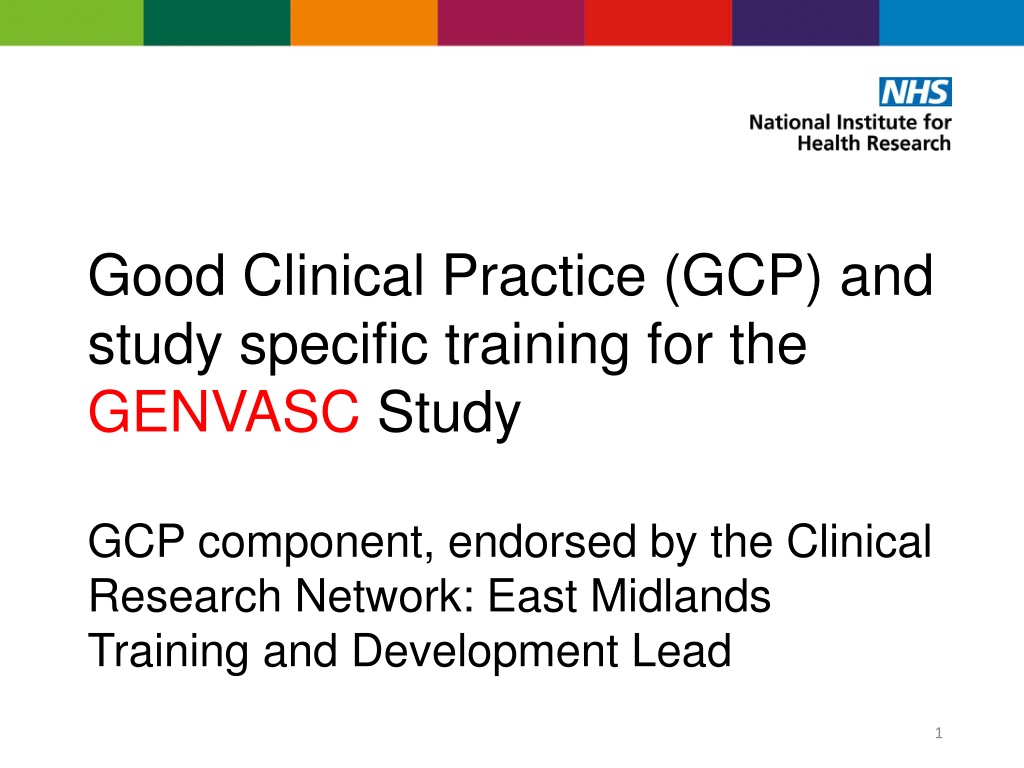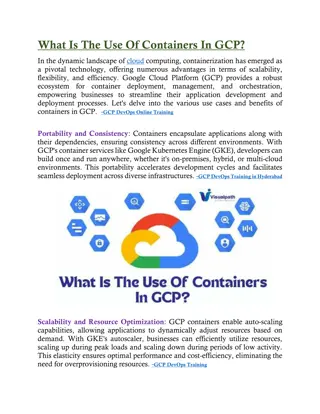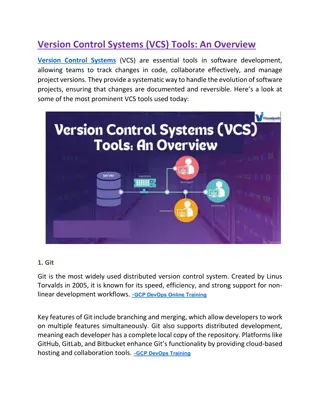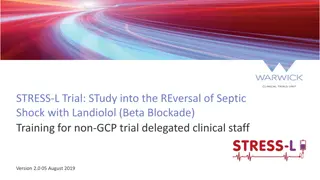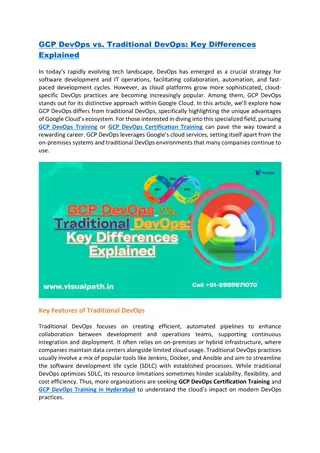GENVASC Study: GCP Training and Study Background
Investigate how genetic information enhances CAD risk prediction in the GENVASC Study, endorsed by Clinical Research Network. Explore the role of lifestyle and genetic factors in CAD risk, with a focus on improving risk categorization accuracy. Targeting a sample size >30,000 from NHS Health Check attendees aged 40-74, this Precision Medicine initiative seeks to revolutionize cardiovascular care.
Download Presentation

Please find below an Image/Link to download the presentation.
The content on the website is provided AS IS for your information and personal use only. It may not be sold, licensed, or shared on other websites without obtaining consent from the author.If you encounter any issues during the download, it is possible that the publisher has removed the file from their server.
You are allowed to download the files provided on this website for personal or commercial use, subject to the condition that they are used lawfully. All files are the property of their respective owners.
The content on the website is provided AS IS for your information and personal use only. It may not be sold, licensed, or shared on other websites without obtaining consent from the author.
E N D
Presentation Transcript
Good Clinical Practice (GCP) and study specific training for the GENVASC Study GCP component, endorsed by the Clinical Research Network: East Midlands Training and Development Lead 11/03/2019 1
Introduction Study background and summary driven with little differentiation of other risk factors till middle age GCP Study Conduct background and principles The Process of Informed Consent Study Set-up 11/03/2019 2 Leicester Biomedical Research Centre
Study Background Coronary artery disease (CAD) is one of the commonest cause of premature death and disability in the UK Lifestyle factors contribute to risk of CAD and risk scores are used to classify an individual s risk and target primary prevention measures Improving accuracy of risk categorisation is a high priority Inheritance plays an important role Significant progress has been made in identifying individual genetic variants that affect risk of CAD Framework for testing whether adding genetic information in the form of a genetic risk score (GRS) can improve current risk prediction of CAD The NHS Health Check Programme provides ideal opportunity to establish a large and representative cohort Adopted onto NIHR portfolio Led by Professor Nilesh Samani and run by Leicester Cardiovascular BRC Precision Medicine 11/03/2019 3 Leicester Biomedical Research Centre
Study summary Objective To determine if the addition of genetic information can improve risk prediction of CAD Target population All patients attending for the NHS Health Check Inclusion criteria 40 to 74 years inclusive Able to give informed consent Exclusion Known history of CVD Known history of blood transmissible infection (e.g. Hep B, HIV) Duration of recruitment and sample size 10 years (30/4/2021) with a target sample size > 30,000 Precision Medicine 11/03/2019 4 Leicester Biomedical Research Centre
GCP BACKGROUND AND PRINCIPLES At the end of this section you will have an understanding of: The importance of GCP in relation to clinical research studies Precision Medicine An awareness of the main principles of GCP 11/03/2019 5 Leicester Biomedical Research Centre
Why do we have standards? Quality of Data Patient Protection Ensure that the data about the drug/intervention is valid and reproducible To ensure safety of patients participating in study is protected Precision Medicine To ensure that drugs/ interventions we develop are safe for patients in the future. Give public assurance that the data is credible 11/03/2019 6 Leicester Biomedical Research Centre
Brief History 1947 1964 Nurenburg Code 1996 Declaration of Helsinki 1996 Precision Medicine 2001 ICH-GCP European Directive MRC GCP 2004 2018 The Policy framework for health and social Care Research UK Law 11/03/2019 7 Leicester Biomedical Research Centre
Research Governance Framework Introduced to ensure a common quality standard applied to all research in the NHS Not law but must be adhered to for all studies conducted within the NHS in England Outlines the standards and principles of good governance that apply to all research involving patients, includes clinical and non- clinical research 11/03/2019 8 Leicester Biomedical Research Centre
UK Regulations GENVASC Information Sharing Agreements Pseudo-anonymisation of data Data held in secure hospital servers Data Protection Act 1998 Human Tissue Act 2004 Professional codes of conduct GENVASC All study samples allocated a unique study ID at LCBRC Samples are stored in a secure LCBRC lab Stored samples are identifiable by unique study ID only Other laws and guidelines to be aware of Local Trust Policies Mental Capacity Act 2005 GENVASC General Data Protection Regulation Act 2018 Ensuring participants are able to give informed consent 11/03/2019 9 Leicester Biomedical Research Centre
STUDY SET-UP At the end of this section you will have an understanding of: The regulatory approvals that need to be in place before a clinical trial can be started in the UK The responsibilities and/or duties of different members of the research team Be able to identify a range of essential documents The purpose of setting up and maintaining a site file 11/03/2019 10 Leicester Biomedical Research Centre
Responsibilities The Sponsor, Chief Investigator (CI) and Principal Investigator (PI) have defined responsibilities Your responsibilities Study site collaborating agreement Abide by RGF, HTA and DPA Maintain site file Follow procedures outlined in protocol Only use approved information documentation Personnel appropriately trained and supervised Permit supply of clinical data to NIHR Leicester Cardiovascular Biomedical Research Centre Permit monitoring at site Ensure the safety and well-being of participants Report any concerns about study conduct 11/03/2019 11 Leicester Biomedical Research Centre
Approvals A study can only start when you have A favourable opinion from a Research Ethics Committee Approval from the HRA Approval from local Trust/Organisation Plus any other relevant approval: i.e. MHRA in case of a drug study and/or Sponsor green light 11/03/2019 12 Leicester Biomedical Research Centre
Essential documents These are documents which permit the evaluation of the conduct of a trial and quality of data produced Demonstrate compliance with GCP and regulatory requirements e.g. Protocol Approval documentation Information sheet/consent form Relevant correspondence CV s of personnel involved in study Section 8 of E6 document provides full details (ICH Guidelines for GCP) 11/03/2019 13 Leicester Biomedical Research Centre
Site file All essential documents are stored in designated file Kept in designated place and maintained by designated person Secure area Limit access Protect from damp, fire etc. Provided at start of trial and maintained throughout File chronologically with most recent uppermost Label superseded documents but do not destroy them Archive Minimum 5 years Stored securely, adequately protected, controlled access 11/03/2019 14 Leicester Biomedical Research Centre
Protocol amendments Substantial amendments require a favourable opinion from the REC, HRA and local Trust/Organisation before they can be implemented Except where urgent safety measures need to be taken Amendments may result in changes to other essential documents (e.g. PIS/ICF) New versions must not be used until appropriate approvals are obtained Version control All study documents must be version controlled 11/03/2019 15 Leicester Biomedical Research Centre
INFORMED CONSENT At the end of this section you will: Understand your responsibilities in the consent process 11/03/2019 16 Leicester Biomedical Research Centre
What is informed consent? ICH-GCP E6 Document 1.28 (1996) A process by which a subject voluntarily confirms his/her willingness to participate in a trial, after having been informed of all aspects of the trial that are relevant to the subjects decision to participate. Informed consent is documented by means of a written, signed and dated Informed Consent Form. In order to be valid consent should be Voluntary Informed Competent 11/03/2019 17 Leicester Biomedical Research Centre
The process of informed consent Crib sheet, Abbreviated information (opportunistic/NHS HC appointment) or Full information if NHS HC Mailshot At practice opportunistic or NHS HC appointment/NHS HC Mailshot Time to consider study and answer questions Agreement to proceed by signed and dated consent form Provide written and verbal information Introduce study idea 11/03/2019 18 Leicester Biomedical Research Centre
Witnessed consent process The witnessed process can be used opportunistically when patients attend for a clinical visit and have a NHS Health Check or when they attend specifically for a NHS Health Check Discuss concept of study If interested provide verbal information 11/03/2019 19 Leicester Biomedical Research Centre
Provide information Verbal information Key points to relay to participant Purpose Voluntary/right to withdraw/will not effect their care What will they have to do: consent, blood sample (DNA), permit use of data Storage of samples and data Confidentiality Contact/further information Crib sheet available: section 16 of site file 11/03/2019 20 Leicester Biomedical Research Centre
Witnessed consent process - Providing further information Written information Provide the participant with the abbreviated participant information sheet (version 3 12/09/13) to read prior to consent Provide detailed participant information leaflet (version 4 12/09/13) to take home and read later Only use Information sheet and consent form approved by REC Must not be changed except by formal amendment Multiple languages available 11/03/2019 21 Leicester Biomedical Research Centre
Information (cont.) Establish level of understanding Mental capacity act (2005) A person is able to make a decision for themselves if they are able to Understand information relevant to decision Retain the information Use or weigh the information Communicate their decision (by any means) Answer questions Provide time to consider participation Samples not analysed for 30 days to allow more time to consider participation 11/03/2019 22 Leicester Biomedical Research Centre
Agreement to proceed Informed Witnessed Consent Sheet Produced from electronic patient record: Version 4.2 (12/09/13) Relay each point verbally Participant to initial boxes (not tick) Participant to print name, sign and personally date Researcher to print name, position, sign and date Consent form filed with Information Sheet Original in site file Copy in primary care records Copy to participant Copy with sample 11/03/2019 23 Leicester Biomedical Research Centre
Optional consent Optional consent field number 7: to be contacted in the future for potential participation in additional studies Lack of consent for this aspects does not preclude participation into study Participant to initial box to consent or cross box if they do not consent to this optional element 11/03/2019 24 Leicester Biomedical Research Centre
Witnessed ICF template 11/03/2019 25 Leicester Biomedical Research Centre
Unwitnessed consent process To be used in conjunction with postal invite for the NHS Health Check or provided prior to attending NHS Health Check. Patient must have time prior to their appointment to read the detailed participant information sheet In case of invite via NHS Health Check mail out: GP study specific invitation letter can be used (version 1 28/04/14) or the approved paragraph about GENVASC incorporated into the NHS Health Check invitation letter (version 1 21/04/2016) Detailed participant information leaflet (version 4 12/09/13) included Unwitnessed consent form (version 1.1 12/09/13) included 11/03/2019 26 Leicester Biomedical Research Centre
Agreement to proceed - Unwitnessed consent process Patients wishing to take part in the study return completed unwitnessed consent form to healthcare provider (GP, Nurse, HCA or Phlebotomist) when attending for their clinical Health Check appointment Consent form must be checked for completeness: If patient ticks no in any boxes (other than last optional element), the consent form is not valid Check level of understanding and answer any questions Copies of consent form required as per witnessed consent process 11/03/2019 27 Leicester Biomedical Research Centre
Unwitnessed ICF template 11/03/2019 28 Leicester Biomedical Research Centre
Withdrawal All participants must be provided with a copy of withdrawal form (V1 27/04/12) Participants can withdraw at any time and do not have to provide a reason Participant that do wish to withdraw complete withdrawal form and return directly to study team Freepost number is included on withdrawal form They can indicate whether samples/data already collected can be used or destroyed Document in patient notes if you are made aware of a withdrawal 11/03/2019 29 Leicester Biomedical Research Centre
Document the process It is a GCP requirement to document the recruitment process Any research activity must be recorded in the participant notes, i.e. recruited, declined or withdrawn consent There are generic research read codes for SystMone & EMIS, but free test must be used to reflect that this activity relates to GENVASC For example: Participant identified as suitable for the GENVASC study, inclusion/exclusion criteria verified. Information sheet/s and withdrawal form (include version numbers) provided. Study discussed and participant happy to proceed, consent obtained, samples taken. Entry will be date and time stamped according to login details 11/03/2019 30 Leicester Biomedical Research Centre
STUDY CONDUCT At the end of this section you will: Understand how to record study data Know how to record and report a protocol deviation Understand how to process study samples 11/03/2019 31 Leicester Biomedical Research Centre
Recording data Sample bottles & consent forms Records must be accurate, legible and complete All fields must be completed Any change should be initialled and dated Strike through original entry with single line (should not obscure original entry) Always use black pen No abbreviations If its not documented it did not happen 11/03/2019 32 Leicester Biomedical Research Centre
Protocol deviations The Protocol must be followed at all times. However, occasionally deviations to the approved protocol may occur. If this happens: Record in the patient notes Report to study team 11/03/2019 33 Leicester Biomedical Research Centre
Data and anonymisation There is a secure GENVASC database, which holds: Participant demographics Cardiovascular risk factors/scores Relevant health information extracted from GP practice databases and hospital systems Over time this database is populated with additional relevant participant health information All participants are allocated a unique study identification number to pseudo-anonymise data Data is gathered using participant NHS and System numbers Data Sharing Agreements are in place between data controllers and data processors 11/03/2019 34 Leicester Biomedical Research Centre
Sample collection/processing Ensure informed consent is obtained prior to taking any study samples Obtain clinical samples in their normal order first, followed by the study samples Study samples may be drawn separately from a second needle if necessary The GENVASC study samples are: 3 x EDTA 2.7ml (red top) Label tubes with patient demographics and date Tick GENVASC participant on sunquest ICE, if taking alongside clinical samples Send study samples to UHL pathology using routine pathology service 11/03/2019 35 Leicester Biomedical Research Centre
ANY QUESTIONS? 11/03/2019 36 Leicester Biomedical Research Centre
